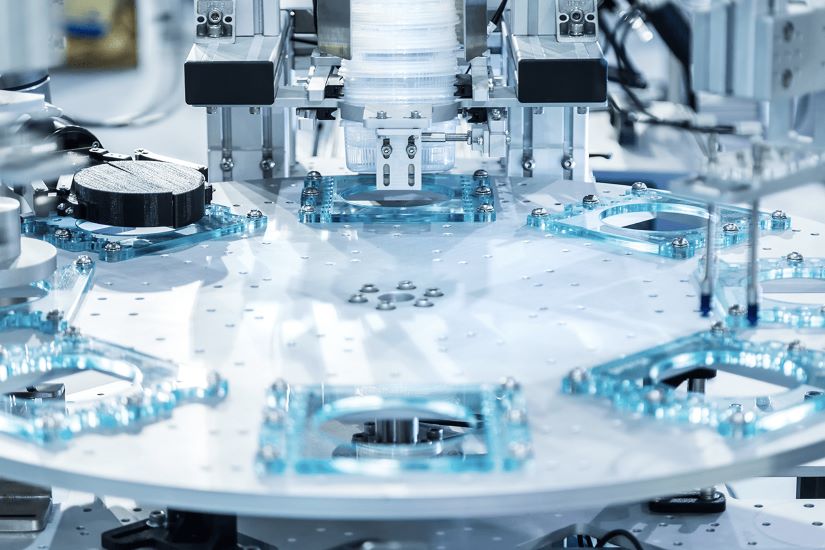How RFID Technology Can Support Medical Device Automation
El $612 billion medical device industry requires absolute precision, cumplimiento de normas, and end-to-end traceability. RFID (Identificación por radio frecuencia) technology has become indispensable, con 78% of the top medical technology companies using RFID to meet FDA UDI requirements. For software service providers, this represents a high-value opportunity to provide mission-critical solutions. Here is your strategic guide:
RFID Application Scenarios in Medical Devices:
1.Sterile Processing and Packaging
- Aplicación: RFID tags on sterilization trays verify autoclave cycles (time/temperature) to ensure compliance with ISO 11607 standards.
2.Unique Device Identification (UDI)
- Track and trace: RFID tags encode UDI-DI/UDI-PI data, enabling automated GS1 compliance for global supply chains.
3.Surgical instrument tracking
- Loaner kit management: RFID-tagged trays in Stryker facilities achieve 99.9% instrument return rates.
- Reprocessing control: Tags track endoscope lifecycles, enforcing AAMI ST79 reprocessing protocols.
4.Implantable device security
- Lucha contra la falsificación: Encrypted RFID tags on pacemakers (Medtronic SureScan) prevent gray market diversion.
- Post-market monitoring: Tags store implant date, automatically send warranty/recall alerts via EMR integration.
5.Cleanroom inventory control
- Inventario en tiempo real: RFID smart cabinets in Philips ISO Class 7 cleanrooms automatically trigger replenishment orders.
- Expiration management: Tags on adhesive dressings alert nurses 30 days before expiration via IoT dashboard.
Escenarios no automatizados y oportunidades de RFID
| Proceso manual | Solución RFID | Impacto |
|---|---|---|
| Handwritten batch records | RFID + eDHR (Electronic Device History Record) | Eliminar 95% documentation errors |
| Visual instrument counts | RFID-enabled tray scanning | Reduce missing tools by 90% |
| Manual sample tracking | RFID-tagged biopsy containers | Cut lab processing time by 50% |
Componentes básicos del sistema RFID
1.Hardware
- Etiquetas: Biocompatible, Autoclave-Safe Variants (See Recommendations Below)
- Lectores: Cleanroom Compatible (ISO 14644) Fixed and Handheld Models
- Antenas: Near Field Models for Scanning Small Implants
2.Software
- Middleware (Middleware): Integration with ERP (por ejemplo. SAP S/4HANA) and QMS (por ejemplo. MasterControl)
- Analítica: Audit Trail Compliant with FDA 21 CFR Part 11
3.Integraciones
- EMR/EHR Connectivity (Epic, Cerner)
- Retrofitting Legacy Equipment with Bluetooth/Wi-Fi Gateways
RFID Recommendations for Medical Devices Tags
| Aplicación | Etiqueta recomendada | Características clave |
|---|---|---|
| Implantable Devices | UHF Ultra Small RFID Tag | Biocompatible (ISO 10993), 2.6×2.6mm |
| Sterilization Trays | RFID PCB Tag | 135°C autoclave-safe, 500+ ciclos de |
| Surgical Instruments | UHF Ultra Small RFID Chip | IP68, survives chemical disinfection |
| Consumables Packaging | Incrustación de UHF RFID | Printable surface, -40°C hasta +85°C |
Cumplimiento de normas: FDA UDI, EU MDR, ISO 13485
Implementation Challenges & Solutions
Issue: Tags Interfere with MRI/Imaging
Solución:
- Use MRI-Safe Tags (Compliant to ASTM F2503)
- Deploy RFID Readers with Medical EMI Shielding
Issue: Biocompatibility Requirements
Solución:
- Choose ISO 10993 Certified Tags for Implants
- Work with a Notified Body for Pre-Market Validation
Why Work with a Medical Technology Specialist Provider?
Medical device customers need:
✅ Regulatory expertise: Deep understanding of FDA/EU MDR workflows
✅ Cleanroom integration: Validated ISO 14644 environmental systems
✅ Clinical collaboration: Co-developed with healthcare providers
We can provide:
- RFID Medical Device Tracking Solutions
- RFID Surgical Tool Inventory Management Solutions
- UHF RFID Tags for Embedding in Devices
[Contact our experts] Design an RFID solution that delivers:
100% UDI compliant
60% faster resolution of recalls
Real-time aseptic process monitoring









